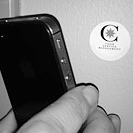Mobile solutions offer cheaper and better service
Intelligent mobile solutions help us perform a growing number of tasks regardless of where we’re located. How can new technology create the greatest benefit in the services sector? What type of services are mobile solutions best suited to? We had a chat with Erik Sörnäs, a Group Manager at Coor, who has coordinated some of the company’s biggest pilot projects in mobile solutions.
A word from our specialist
You have participated in a few pilot projects—what are your conclusions from them?
− In the projects where we use mobile solutions, we have secured a number of gains. We've reduced duplicate working, improved quality, shortened lead-times and freed up time. We can get more out of our work on customers' premises, which improves our visibility and availability, and our customers perceive this positively. They also appreciate that our self-checking has improved and we can clearly see when and where patrols were conducted in our system, for example.
Can you give us some examples of mobile solutions that Coor is currently using?

− The technology we use most widely is based on RFID (radio frequency identification) technology. A tag is attached to an item (such as plant or a room), which is then programmed with unique information, such as the type of item it is, its location, instructions for patrolling or safety checks. This information is then read using a phone to help the person that will be checking the item. Coor's staff can also order materials, report a fault on an item or report time against a work order directly on site by phone.
What are the benefits of mobile solutions?
− For us, what's been important has been programming checklists and instructions that our staff can read on site and thus assure quality. In addition, we make our work more effective when administrative duties and flows get simpler with automation and execution on site with our customers. In the next step, when the system is linked to Coor's regular BPM system, these benefits will increase further. Fully integrated system links enable fault reporting and fix reports done on mobiles to be sent to the BPM system automatically, for example, resulting in a faster BPM process that saves time and money for us and our customers.
But doesn't it cost a lot?
− No, the technology has made so much progress that it's not especially expensive. You need a handheld unit, and you can often use ordinary phones. Systems can be leased, so there's no major investment required. What can cost money is if you want to integrate mobile systems with regular BPM systems, resulting in fully integrated processes. However, I'd like to emphasize that the benefits of mobile solutions are substantial even if these systems are not fully integrated.
Want to find out more about how mobile solutions can improve your service delivery?
Please contact Erik Sörnäs.

Erik Sörnäs
Head of the Workspace Management Centre of Excellence
